Millennia brings reactive eras and city-builder elements to turn-based strategy

It’s finally time: I can talk about my favorite game from gamescom 2023! Millennia is an upcoming 4X turn-based strategy game very much in the mold of Civilization that’s being developed by C Prompt Games, a studio made up from experienced RTS developers with roots in Age of Empires 2, Age of Mythology, and StarCraft 2, and published by the grand strategy maestros over at Paradox Interactive – a winning combination. In Millennia, you lead your civilization from the Stone Age to the Space Age, settling cities, expanding your empire, building your economy, waging war, and engaging in diplomacy.
However, just like Microsoft’s upcoming Ara: History Untold, Millennia does a few things differently from the genre’s grand hegemon, innovating on the familiar formula. One of those aspects very much fits into Paradox’s philosophy and will greatly enhance replayability: While civilizations will all come with certain characteristics and unique units that remain the same from playthrough to playthrough, players can change how they play by choosing from various National Spirits, which grant them additional bonuses, units, technologies, or buildings throughout a game. As a match progresses, you can add even more National Spirits to your civilization, customizing it depending on what’s going on in the world. In a way, it takes Humankind’s reactive approach to faction-building, but eliminates the big weakness of Amplitude’s title, which erodes faction identity far too much.
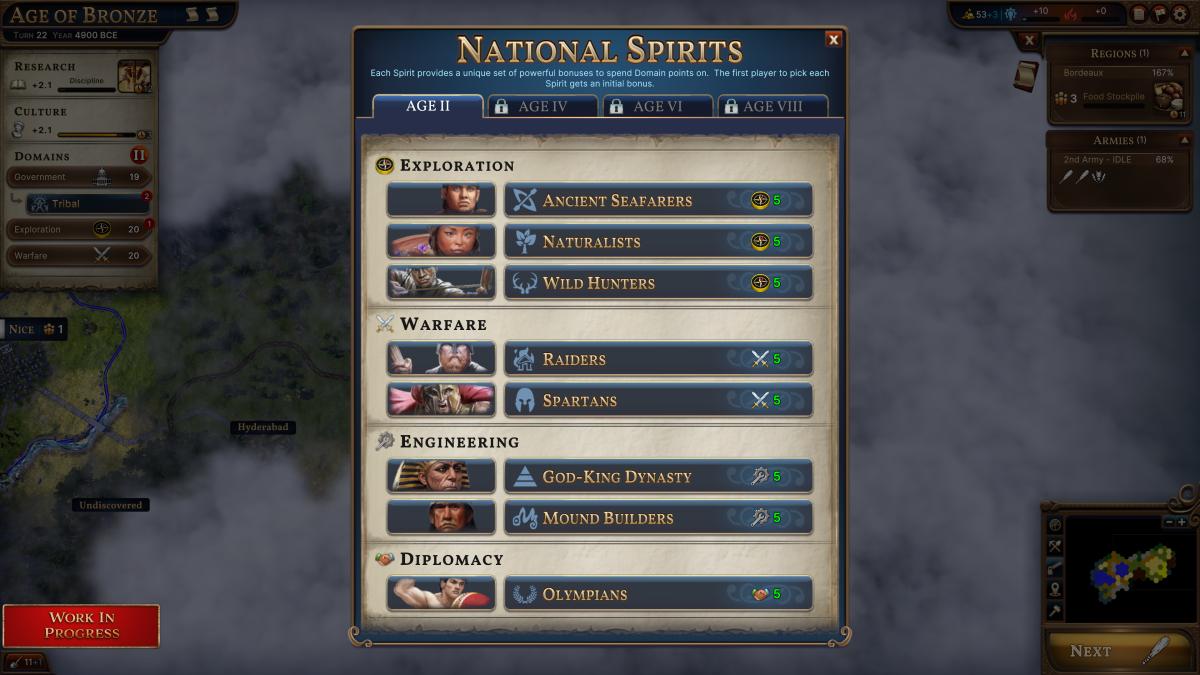
Additional National Spirits, which are essentially skill trees, are unlocked in specific ages.
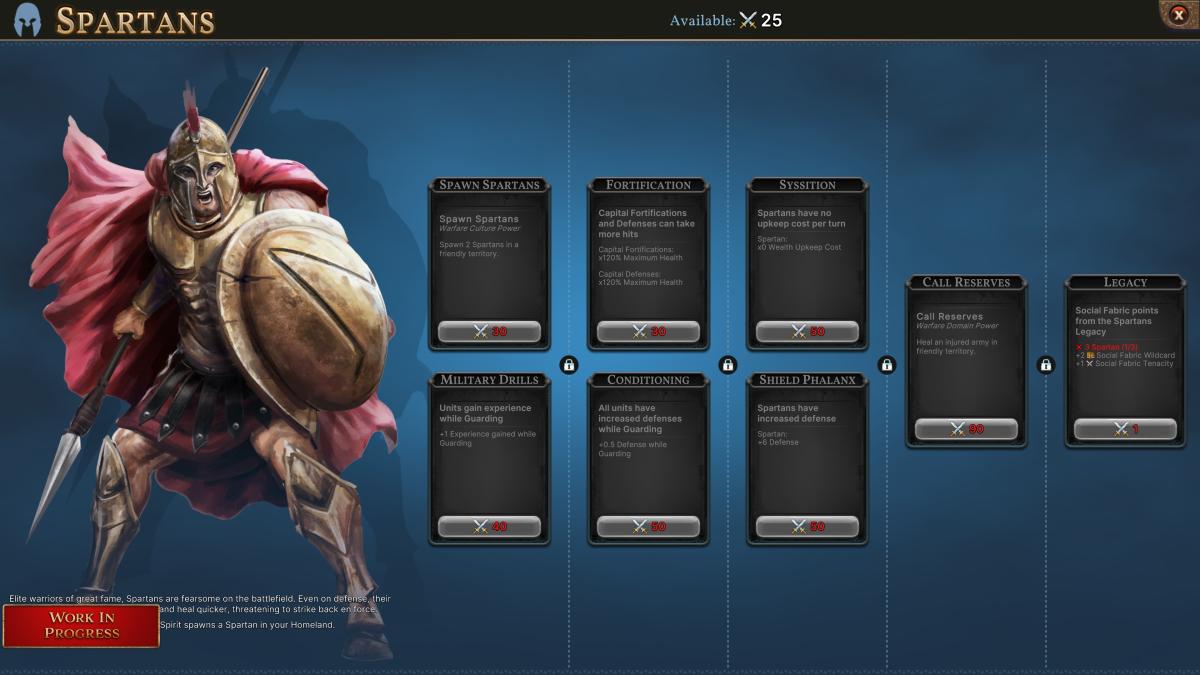
You can activate their nodes by collecting Domain Points of the corresponding category.
In the match I played at gamescom, I took control of Japan – a Japan that followed the traditions of hunting, one of these available National Spirits. This gave me access to the hunter unit, among other things, which is able to go out into the wild, occupy a resource, and send supplies of this resource back to its home city. It provides a useful early boost to the economy and can grant you access to exotic goods you may not otherwise be able to gain. Depending on the combination of National Spirit and civilization you pick, you can vary your play style quite a bit, I’m told by the developer guiding me through the session.
The most unique feature Millennia offers is the way eras work in the game. You advance from age to age as you research more technology from your current time – nothing new. However, unlike in other games, you’re not just advancing your own age – if one civilization enters the Iron Age, everyone else does as well, whether they are ready or not. Each age comes with its own bonuses, penalties, buildings, and other features. And that’s not all, because Millennia doesn’t just have a standard array of eras in store. In case you’re neglecting the hygiene of your cities and have a high level of sickness in your empire as you advance to the next age, you won’t end up in, say, the Renaissance, but in the Age of Plague instead. Not only does the Age of Plague bring with it all the problems indicated by its name, you also just threw the entire planet into this calamity. That’ll make sure that everyone has to deal with this new challenge, at least, and may even help you gain an advantage if they fail to rise to the occasion while you manage it.
There’s lots of different ages you can reach by meeting certain conditions. Some, like for the Age of Plague, are pretty obvious and well telegraphed – you’ll get plenty of notifications about your cities’ hygiene going down the drain and that not exactly being a great thing. Others have hidden conditions and may even contain the chance at an early victory. If you’re already dominating half the world after a certain period of time, the game won’t ask you to paint the map until the end and mop up every single AI player – it’ll present you with an opportunity to grab the win immediately in a Victory Age. If the rest of the world manages to thwart your ambitions at this point, though, it’s game over for you.
While history is always at the forefront of Millennia, just like in other Paradox titles there is plenty of room to subvert and twist our past. How about an Age of Wonders, in which every civilization builds golden monuments and pyramids, making the planet seem like an advanced alien world for the rest of the game? Heck, speaking of aliens: One of the Victory Ages that may appear in the endgame is to deal with an alien invasion. In the Age of Aether, the game fully goes into steampunk mode with flying galleons and floating cities, while the Age of Utopia has you settle giant underwater towns. Things can get pretty wild and varied, and that’s going to be one of the big strengths of this title. The fact that these Variant and Crisis Ages are reactive to what’s actually going on in the world adds an awesome dynamic to it.
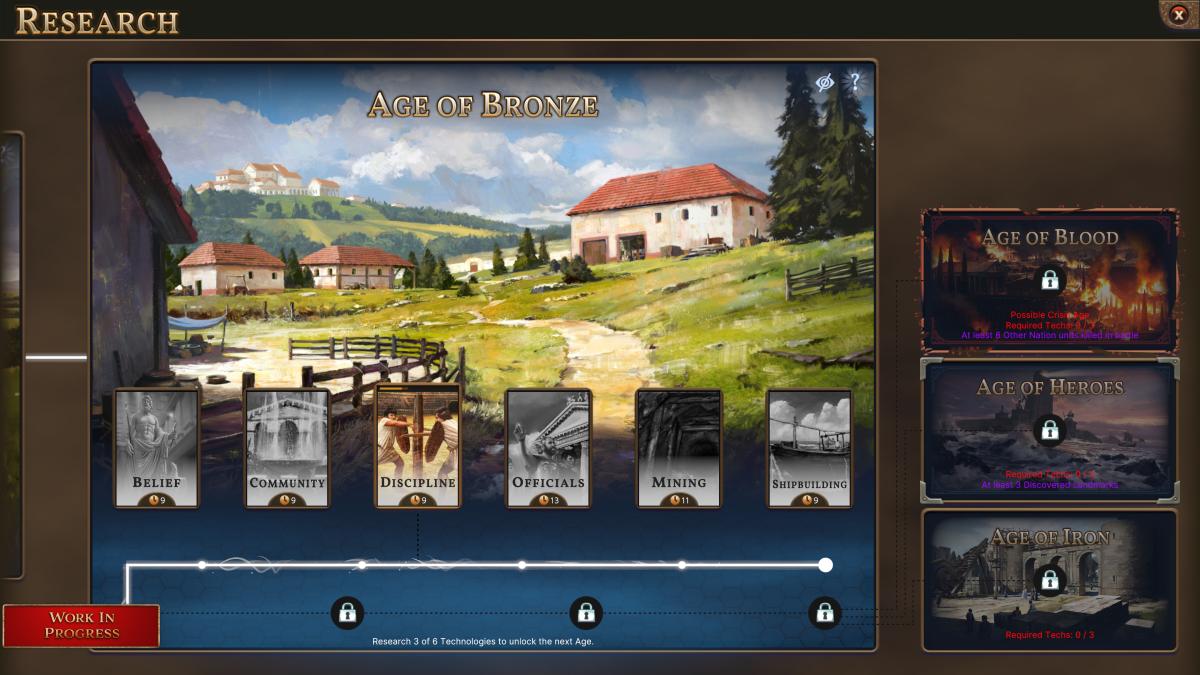
Another fantastic innovation – and one that Millennia shares with Ara, actually – is the inclusion of traditional city-building elements into the title. Like in any other 4X turn-based strategy game, you can improve your tiles with various buildings. Interestingly, you don’t use worker units for this. Instead, you can construct most regular improvements with construction points, which you get over time. You start with your regular farm on wheat or rice or whatever you can find, and that’ll provide your city with additional food. But, just like in Ara, this is only where things begin. You can build a mill and a bakery on other tiles on the city’s territory to grind the grain into flour and then bake it into bread, which both provide much more food than the original resource. You can then transfer this to other cities in the empire, boosting their growth with a targeted concentration of resources.
I’m told that you’ll need to build up and manage complex economic supply chains as the game goes on and the economy develops. If this is going to be a trend for 4X titles going forward, I’m very much on board with it – while I love making supercharged tiles in Civilization, there is just something about production chains that’s immensely satisfying. When you see that humble ore resource you built a mine on go through several stages of refinement and combination with other goods to then end up in something tangible like a shiny new military unit, that’s just an unbeatable feeling.
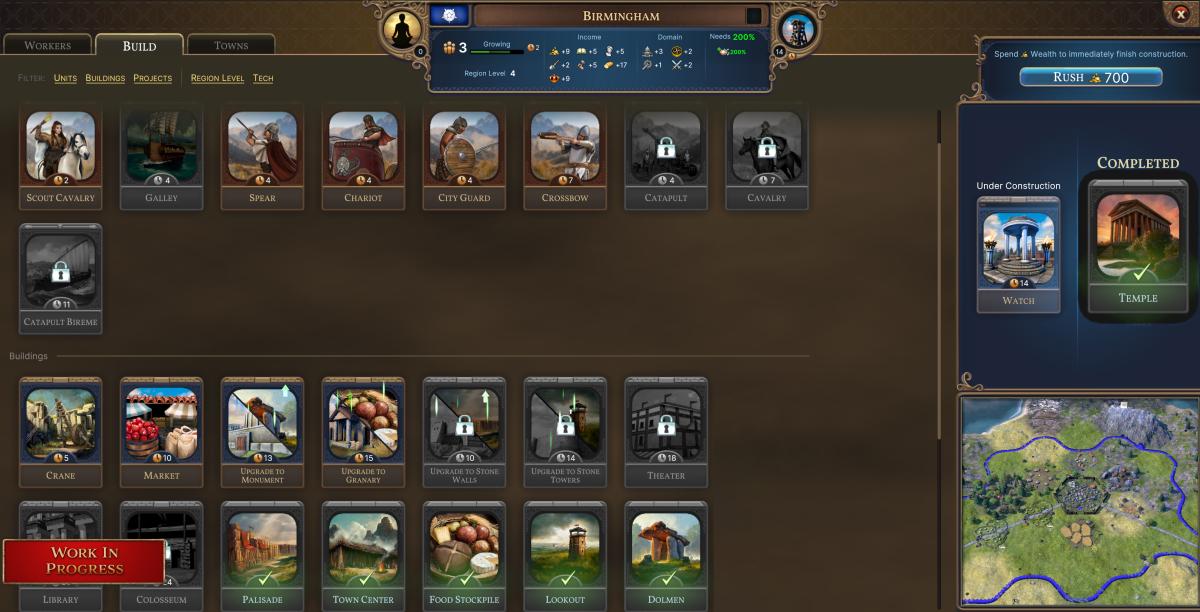
Military units can be stacked to build armies similar to titles like Age of Wonders or Humankind. When hosts encounter each other, you’re brought to the battlefield where you can see the little troopers duke it out automatically. The animations are pretty simple, but give you a lot of good information – rates of attack, damage, order of attack, and so on. You’ll know which of your units do well and which don’t. Each troop type has different strengths and weaknesses to consider and there are elements like terrain and defensive structures you need to mind as well. They’ll gain experience as they fight, becoming stronger over time, and can be upgraded when new technology becomes available.
When the developer guided me through an invasion of Rome, he had me build a fort just outside the enemy border, which automatically connected my nearest city as well as the closeby enemy town with the outpost by road (obviously they’d hand-crafted this scenario to show this feature off, telling me to build an outpost at exactly the right position and range) – an easy way to make reinforcements reach the frontlines much quicker. Unlike the improvements on my own territory, this fort had to be built by a unit of pioneers present on the map.
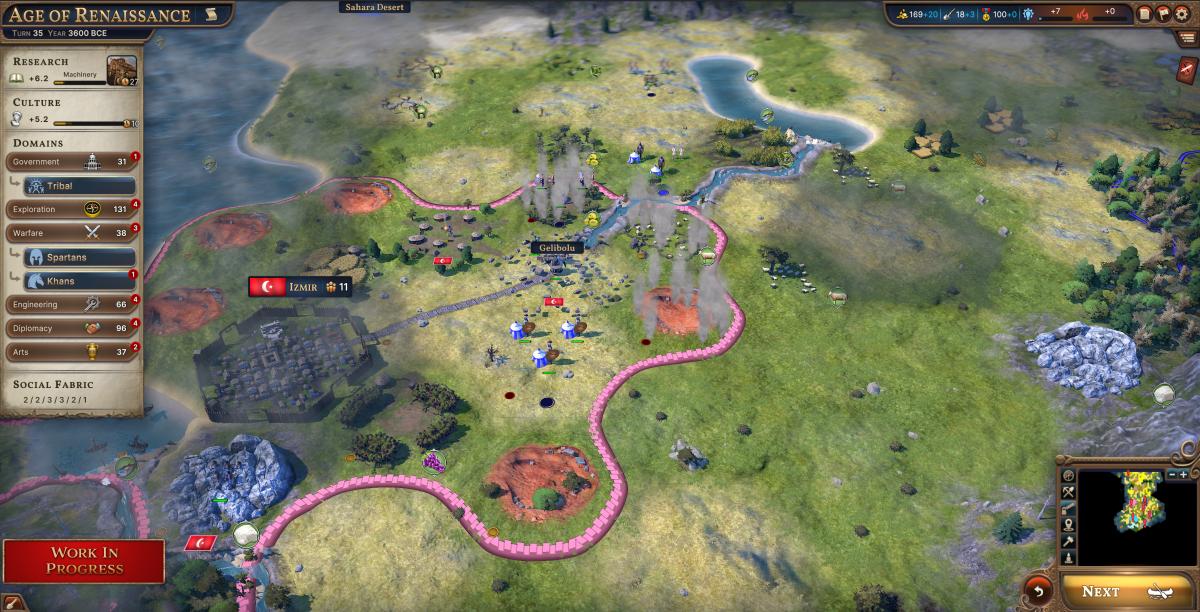
Another feature of the game that came in handy during this conquest was the Domain mechanic. Each civilization has six Domains – Exploration, Government, Warfare, Diplomacy, Engineering, and Arts – they can invest in. The higher your investment into these areas, the better powers you get from them. You can adopt new government systems, spread religion, claim territory, or heal army units through this mechanic.
Millennia also has its own version of the great people mechanic, allowing you to recruit various historical and mythical personalities from all walks of life to use in different positions in your realm – I got Beowulf to command one of my armies ravaging Roman territory. Of course, the Viking folklore hero is a force to be reckoned with in that day and age, but he’d eventually lose usefulness due to the world moving to different military technologies.

Random world events can pop up as you explore.

As is the case with other games of this genre, you start out small.

Planning your infrastructure is key to connect your empire into one big entity.

New cities need to grow before you can directly control them.
In Millennia, conquering or even founding another city won’t immediately give you direct control over it. They’ll start out as colonies that need to grow into vassals, which provide you with the revenue and resources from their territory, but you won’t be able to build units or structures in them. This makes empire management a lot easier initially. Once they’ve reached a certain size, you can assume direct command over them.
Neutral city states, Barbarians, natural wonders, and good old goodie huts populate the map aside from yourself and your rivals, providing ample opportunity for trade, diplomacy, exploration, and fighting. You can build world wonders, compete in the space race, and pursue the kind of victory you want to achieve – the world is your oyster.
At its core, Millennia feels very familiar – all the usual pieces are there. However, the new layer of the city-building mechanics as well as the exciting nature of the reactive eras add some exotic spice to the entire recipe. I, for one, can’t wait to taste more of this particular dish.
Millennia is set to be released on PC in 2024.
